Oct 2011
Oct 2011 Estelle Greeff
Growth Path on the road to success
Growth Path on the road to success Estelle GreeffIt has been a year since government adopted the New Growth Path – a broad framework that sets out a vision and identifies key areas where jobs can be created. Approved by Cabinet last October, it is aimed at addressing unemployment, inequality and poverty.
Since the adoption of government’s New Growth Path (NGP) about a year ago, almost 200 000 jobs have been created, according to the Minister of Economic Development, Ebrahim Patel.
The goal of the NGP is to create about 500 000 jobs a year, meaning five million job opportunities during the next 10 years. This will reduce unemployment from 25 per cent to 15 per cent. An important aspect of the plan is partnerships between business and government.
DTI
The Department of Trade and Industry (DTI) has created more than 60 000 jobs through its support and incentive programmes. These include initiatives such as the Enterprise Investment Programme aimed at helping businesses to grow through investment grants.
The DTI’s Tourism Support Programme is creating jobs by attracting new people to the tourism sector, particularly those who have been disadvantaged in the past.
Another DTI incentive programme, the Black Business Supplier Development Programme, helps black-owned small firms to become part of the mainstream economy and to create jobs through cost-sharing grants.
Jobs have also been created through the department’s Cooperative Incentive Scheme, which helps cooperative enterprises in the inclusive economy (formerly known as the second economy) to grow.
Film and agriculture
The DTI’s Film Production Incentive Programme has created jobs in the film industry through offices located in Cape Town, eThekwini and Gauteng. These offices are responsible for creating jobs by promoting and developing the film industry.
In the agricultural sector, more than 100 000 jobs have been created through programmes started by both the national and provincial departments of agriculture to support small-scale farmers.
Water conservation
The Department of Water Affairs provided full-time job opportunities to more than 30 000 people through its Working for Water and Working for Land water conservation programmes.
The department aims to increase the number of employment opportunities created through these programmes to 60 000 next year.
Youth
The Department of Rural Development and Land Reform has created 7 500 jobs through its National Rural Youth Service Corps, which targets young people from deep rural areas.
Minister Patel said government was planning to increase the number of work opportunities in the Community Works Programme to one million by 2014, of which up to 90 per cent could be earmarked for young people.
Crime drops, but challenges remain
Crime drops, but challenges remain Estelle GreeffGovernment is winning the war against crime. This was confirmed during the recent release of the crime statistics for the year starting in April 2010 end in March 2011. Crime statistics showed a marked drop in all seven categories of contact crime. These include murder, attempted murder, sexual offences and assault with serious grievous bodily harm, common assault, aggravated robbery and common robbery.
Making progress
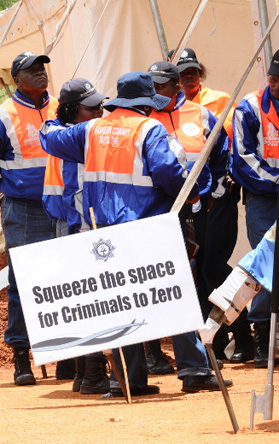 Police Minister Nathi Mthethwa said the release of crime statistics should not be mistaken for a yearly event in which numbers and graphs dominate the discussion. It should rather be an occasion to reflect on the steps that government had taken to fight crime in a particular year. He said the crime statistics showed that government was making progress in some areas, while there were some crimes that continued to be a challenge in fighting.
Police Minister Nathi Mthethwa said the release of crime statistics should not be mistaken for a yearly event in which numbers and graphs dominate the discussion. It should rather be an occasion to reflect on the steps that government had taken to fight crime in a particular year. He said the crime statistics showed that government was making progress in some areas, while there were some crimes that continued to be a challenge in fighting.
Murder was down by 6,5 per cent and sexual offences by 3,1 per cent. Assault with intent to do grievous bodily harm dropped by 4,5 per cent, while robbery with aggravating circumstances was down by 12 per cent. In other categories, the statistics also showed a general decrease, except for the drug-related crimes which increased 10,2 per cent. Drunken driving cases were also up by 3,5 per cent.
Bank robberies
The biggest improvement noted in the crime statistics was a significant decline in bank robberies which decreased by a massive 58,1 per cent, with just 39 cases recorded in the 2010/11 financial year, as opposed to the 93 cases recorded in the 2009/2010 financial year.
Business Against Crime South Africa (Bacsa) said the drop in serious crime was the result of improvements in the criminal justice system and improved policing.
Bacsa CEO Graham Wright said systematic improvements in visible policing, crime detection and response, and steps by business to improve security, had a direct impact on the level of business robberies and burglaries, he added that it was clear the country was moving in the right direction.
Polokwane awash with new jobs
Polokwane awash with new jobs Estelle GreeffJob creation
Car washers in Limpopo’s capital, Polokwane, who have been operating illegally, will soon have the opportunity to run legal businesses. A R1,2 million car wash facility opens later this year as part of a job creation project called Iperekeng Dikwena, recently launched in the capital city. Iperekeng means “work for yourselves.”
“The project is aimed at benefiting the car washers who have been operating illegally,” said municipal spokeswoman Noko Lebea.
Training
The car wash facility, which will be built before December, will be run as a cooperative business.
A 17-member steering committee representing the local taxi association and street vendors has been established to manage the cooperative. Members have received training on how cooperatives work and how to manage them.
The project will not only create jobs and develop business skills, but will also address water losses. Chairman of Limpopo’s local economic development and finance portfolio committee Eddy Maleka, said: “The municipality is currently experiencing water losses due to the illegal activities of the car washers in the city.”
Local labour
The facility will accommodate 34 vehicles and will be fitted with pre-paid water and electricity meters as well as a recycling water system and storeroom.
Maleka said local people would be hired to build the wash bays.
A taxi driver from Polokwane Taxi Association, Gilbert Matlala, said he would take his taxi to the car wash and also convince others to support the project.
Food vendor Mosima Ramatsoma said she was looking forward to working with the car washers. “I will make sure that my clients wash their cars at this facility while the car washers will refer their customers to me while waiting for their cars to washed.”
Good health across the board
Good health across the board Estelle GreeffHealthcare is a Constutional right to which all South Africans are entitled. It should not depend on how rich or how poor you are. To ensure access to quality healthcare across the board, government is introducing the National Health Insurance (NHI) system.
The NHI is a financing system that will ensure that all South Africans have access to essential healthcare, regardless of financial or social status, or their ability to make a direct financial contribution to the NHI fund.
Why is there a need for NHI?
The quality of public healthcare is not up to scratch, says Health Minister Aaron Motsoaledi. He said some 84 per cent of the country’s population depended on public healthcare, yet many people continued to die prematurely and to suffer from poor health.
He pointed out that diseases that could be treated and prevented were not always dealt with in time and that private healthcare like medical aid was not affordable for most people.
Which services will be funded?
The NHI will offer all South Africans a defined package of health services. It will offer basic healthcare at all levels, from primary healthcare, to specialised and highly specialised care.
This will not include procedures such as cosmetic surgery.
Have your say
The NHI is in a Green Paper phase, during which all South Africans can comment on government’s plans for the new scheme. Comment is welcome until the end of November 2011.
Once feedback has been received, a White Paper, which contains the final policy statement, will be drawn up.
Getting ready
At municipal level, a team of seven specialists will be placed in each municipal district. These include a district gynaecologist, paediatrician, anaesthesiologist, family healthcare physician, advanced midwife, advanced paediatric nurse and an advanced primary healthcare nurse to deal with the most common health problems.
Secondly, the School Health Programme will be put into practice with nurses being employed at schools on a full-time basis.
Thirdly, the municipal-based primary healthcare system will be put into practice with 10 primary healthcare agents assigned to each ward. They will deal with basic issues such as HIV and AIDS testing, blood pressure, diabetes, immunisations, pregnancy care, prevention of diseases and promotion of healthy living in communities.
Quality control
The quality of healthcare is an essential element for hospitals to be accredited for NHI.
Each hospital will have to implement six basic quality control measures. These are cleanliness, safety and security of staff, attitude of staff, elimination of long queues, infection control and adequate stocks of medicine.
Pilot phase
NHI is a 14-year project with the first five years seen as the preparatory phase. An audit is being carried out to assess the readiness of hospitals throughout the country. The pilot phase of the NHI will start in April 2012 in 10 selected districts.
NHI - What you think Following government’s announcement to implement the National Health Insurance (NHI) scheme next year, Vuk’uzenzele spoke to ordinary South Africans to find out how they feel.
 Mandla Nkomo (37) of Yeoville welcomed the news. “I’m so happy because people like me who earn very little do not enjoy good healthcare since we can’t afford expensive bills from private hospitals. The NHI will correct this.”
Mandla Nkomo (37) of Yeoville welcomed the news. “I’m so happy because people like me who earn very little do not enjoy good healthcare since we can’t afford expensive bills from private hospitals. The NHI will correct this.”
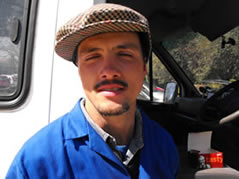 Gerry Kruger (29) of Krugersdorp challenged government to first solve problems in public hospitals before the NHI starts.“I once went to a public hospital with my colleague who was injured at work and needed immediate attention; we waited for four hours before he was attended to. I think government must solve such problems first.”
Gerry Kruger (29) of Krugersdorp challenged government to first solve problems in public hospitals before the NHI starts.“I once went to a public hospital with my colleague who was injured at work and needed immediate attention; we waited for four hours before he was attended to. I think government must solve such problems first.”
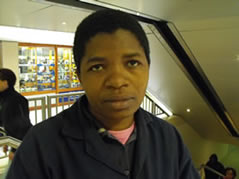 Moratha Matsha (30) of Tembisa on the East Rand said, “I hope that when the NHI starts, ambulances will be available when called during emergencies and all people will be treated equally and get the best service found in private hospitals.”
Moratha Matsha (30) of Tembisa on the East Rand said, “I hope that when the NHI starts, ambulances will be available when called during emergencies and all people will be treated equally and get the best service found in private hospitals.”
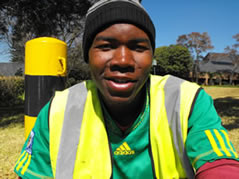
Bongani Mabaso (27) of Krugersdorp feels that health workers’ behaviour should change before the NHI starts. “Government should first change the bad behaviour of staff; they treat patients badly and discharge them from hospitals before they are ready, and these things don’t happen to people with money in private hospitals.”
If you who wish to submit comments on the Green paper Policy on National Health Insurance, you can send an e-mail to nhi@health.gov.za.
For more information, call the Ministry of Health at 012 395 8000 or 012 395 9000.
Gearing up for NHI
Gearing up for NHI Estelle GreeffMeeting the standards for the National Health Insurance (NHI) system is an important priority at the Dr George Mukhari Hospital in Ga-Rankuwa near Pretoria. A lot has already been done to comply with the core standards, but there are still gaps that need attention.
 The implementation of the NHI system is getting closer and the only talk at Dr George Mukhari Hospital is of meeting the requirements to be approved for the system.
The implementation of the NHI system is getting closer and the only talk at Dr George Mukhari Hospital is of meeting the requirements to be approved for the system.
“Our future depends on meeting those standards and if we don’t, we might as well close down the institution,” says hospital CEO, Dr Trevor Fisher.
He is confident that during the final assessments, the hospital will comply in the important areas. A new hospital building is expected to be completed by 2016.
Tool for improvement
Hospitals gearing up for the NHI will be expected to maintain specific quality standards which include improving cleanliness, patient and staff safety and security, infection prevention and control, the availability of medicines, reducing waiting times, and creating a positive and caring attitude among health workers.
The core standards serve as a tool to improve the quality of healthcare at hospitals rather than punishing them, said Dr Fisher. Dr George Mukhari Hospital was among the 800 health facilities assessed by July to see whether they complied with the standards.
Good progress
Dr Fisher said the assessments showed that good progress had been made at the hospital, which scored A, B and C symbols in some areas. However, he pointed out that there were still gaps, which needed to be addressed for the final assessments.
He said the hospital was now in the process of putting all the necessary systems in place to meet the standards. They are also making sure that all the different departments are aware of the importance of meeting the core standards, including behaviour towards patients.
Back to basics
The Dr George Mukhari Hospital services communities from Garankuwa, Mabopane, Soshanguve and Wintervelt. It has 1 600 beds, 3 200 staff members attending to over 1 000 patients per day and delivers about 10 000 babies per year.
“If we want to get it right with the NHI, we must first look at building clinics and getting the staff back to basics. If the hospital are still overcrowded, this means that we didn’t spend enough on primary healthcare or if people don’t get the required treatment at the clinics, it means we’ve failed,” Fisher said.
Safe havens for victims
Safe havens for victims Estelle GreeffPolice stations all over South Africa are becoming more victim-friendly through the Victim Empowerment Programme.
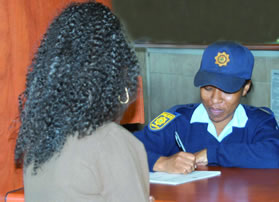 From rape victims to abused women and children, those with no roof over their heads and even desperate parents, Aaron Maepa and Philda Setshedi have heard and seen it all.
From rape victims to abused women and children, those with no roof over their heads and even desperate parents, Aaron Maepa and Philda Setshedi have heard and seen it all.
The two are social workers who volunteer at the Pretoria Central Police Station’s Victim Empowerment Programme to counsel and help victims of crime.
Police officers send crime victims who need help to the volunteers who are based at the police station’s victim friendly room (VFR). This is a relaxed environment, which helps to calm the victims and make them feel secure while Setshedi and Maepa try to help.
Place of safety
Police Ministry spokesman Zweli Mnisi said that often police were the first people to come in contact with traumatised victims. “The purpose of the VFR is therefore to ensure that all traumatised victims of crime are treated with dignity and respect with the necessary confidentiality in a private environment,” he said.
The walls of the VFR are painted in bold colours with rainbows, clouds, and animals reassuring victims, especially children, that this a place of safety. In one corner, small chairs and a table with toys, colouring books and crayons have been arranged to keep children occupied.
Apart from the main room which contains sofas, a TV, fridge and microwave oven, there is also a bedroom in case victims need to stay over.
“Some women can’t go home because they are abused by a boyfriend or husband. If they come to the police station at night they can stay here until the morning when we make other arrangements. We often put them in contact with shelters and help them find somewhere to stay,” Setshedi said.
Women and children
The social workers deal mostly with women and children who are victims of rape, abuse or domestic violence. “We talk to them, ask them what the problem is, what they need, and then we try and help,” said Setshedi.
Maepa said when dealing with children, the first step was to let them know that they are in a safe environment. “We get them to relax, give them toys to play with and then encourage them to talk about what’s happened to them.”
Apart from victims of crime, Maepa and Setshedi have helped runaway children reunite with their parents and assist those who have trouble getting their identity documents or social grants.
Victim support
Victims are interviewed in the VFRs, their statements are taken and where necessary, are referred to professional social workers or health workers for support.
There are currently 900 VFRs across the country. While most are at police stations, some are situated at local Family, Violence and Child
Protection Units, railway stations and airports. Plans are in place for all police stations to have VFRs by 2014.
For more information about victim-friendly rooms, contact your local police station.
Limpopo crime spots in the spotlight
Limpopo crime spots in the spotlight Estelle GreeffA recent anti-crime crusade in Limpopo took the form of site visits to the province’s crime hotspots to assess the situation first hand. This will help the provincial government to decide on suitable crime-prevention measures as part of its commitment to reduce crime in the province.
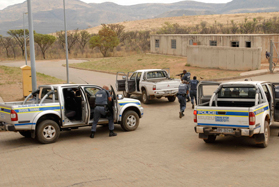 Safety, Security and Liaison MEC for Limpopo, George Phadagi visited Musina, Thohoyandou and Louis Trichardt to see safety-related problems for himself.
Safety, Security and Liaison MEC for Limpopo, George Phadagi visited Musina, Thohoyandou and Louis Trichardt to see safety-related problems for himself.
Border post
At the Beit Bridge border post in Musina, which is one of nine ports of entry into the province and the busiest in the country, MEC Phadagi looked at issues such as cigarette smuggling and illegal border crossings.
He inspected the South African and Zimbabwean sides of the border post to determine the quality of law enforcement and saw the Beit Bridge taxi rank and a refugee centre.
Overcrowding
Phadagi found overcrowding and unhealthy living conditions at the refugee centre. The provincial government has given the assurance that the relevant authorities will address these issues immediately.
The MEC also took note of the community’s concerns about the high rate of rape, murder, robbery and house burglary in the area.
Alcohol abuse
In Thohoyandou, Phadagi visited Limpopo’s Matatshe Maximum Prison and the police station. In Makhando, he paid a visit to the Manini Place of Safety for Children.
Community members told Phadagi that liquor outlets created a problem because they often led to alcohol abuse and irresponsible behaviour, which was the main cause of criminal attacks on residents.
The provincial government has since suspended the issuing of liquor-trading licences while relevant laws are being revised.
To report crime, call Crime Stop: 08600 10111
Parents, schools share education duty
Parents, schools share education duty Estelle GreeffIn his State of the Nation Address, President Jacob Zuma promised that education would be a key priority for the next five years. “We want our teachers, learners and parents to work together with government to turn our schools into thriving centres of excellence.”
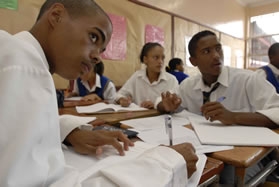 Government is committed to improving learning and teaching for every learner in South Africa. To achieve this, President Jacob Zuma made it clear that that teachers must be in school and in class, on time, teaching, with no neglect of duty and no abuse of pupils. “Children should be in class, on time, learning, be respectful of their teachers and each other, and do their homework,” he said.
Government is committed to improving learning and teaching for every learner in South Africa. To achieve this, President Jacob Zuma made it clear that that teachers must be in school and in class, on time, teaching, with no neglect of duty and no abuse of pupils. “Children should be in class, on time, learning, be respectful of their teachers and each other, and do their homework,” he said.
To help improve teaching for both teachers and learners, government has launched the Quality Learning and Teaching Initiative. It will focus on improving education as well as health in schools for the next five years. It includes, among other things a Code for Quality Education.
Take responsibility
The campaign calls on all parents, teachers, learners, schools and the community at large to take responsibility for improving the quality of education.
The campaign will:
- inform all South Africans about the importance of education and their roles, responsibilities and obligations towards education
- mobilise communities to monitor and support schools, teachers and learners
- improve the quality of education for all children, especially the poor, and demonstrate this improved quality through improved learner achievement.
Achieve excellence
The campaign is currently underway at national, provincial, regional, local and schools.
At the Northern Cape launch of the Quality Teaching and Learning campaign, Premier Hazel Jenkins said, “Working together we can certainly achieve success and brilliance in our schools and improve learner performance.”
The time has therefore come for all South Africans to join hands in efforts to ensure that our children get the best quality education. This in turn will enrich and build our nation.
Quality education for all cannot be achieved by government alone; it requires the joint efforts of all role players. Each role-player is called upon to make a commitment to the “Code for Quality Education”. The Code describes the responsibilities and discipline required of them.
The pledges include the following:
As a teacher, I promise to:
- teach, to advance the education and the development of learners as individuals
- respect the dignity and rights of all persons without discrimination
- develop loyalty to, and respect for, the profession
- be punctual, enthusiastic, well prepared for lessons and of sober mind and body
- improve my own knowledge and skills to be more effective
- maintain good communication between teachers and learners; among teachers themselves; and between teachers and parents
- provide information to parents on their children’s progress on a regular basis
- eliminate unprofessional behaviour, such as teacher-pupil relationships, drunkenness, the use of drugs, assault and sexual harassment .
As a learner, I promise to:
- accept that the main reason for being in school is to learn and develop academically, socially and culturally
- adhere to school rules
- respect the legitimacy and authority of teachers
- participate in Learner Representative Councils to safeguard my interests
- show respect to other learners and not to discriminate
- avoid anti-social behaviour like theft, vandalism, assault, sexual harassment, alcohol and drug abuse, as well as other activities that disrupt the learning process.
As a parent, I promise to:
- take part in school activities, including school governance structures
- have regular discussions with my children about general school matters
- cultivate a healthy, open and cooperative relationship with my children’s teachers
- create a home environment that is favourable for studying
- help to protect educational resources such as textbooks, chairs, tables and other objects
- contribute, within my means, the necessary resources to the schooling of my children.
For more information, call the Department of Basic Education at 012 357 3000 or call the department’s Hotline on 0800 202 933
Adopt a school: Change a life
Adopt a school: Change a life Estelle GreeffThe adoption of schools can help to create better environments for teaching, which will lead to more positive learning experiences. This can change learners’ attitudes towards learning, which, in turn, will change their communities and the world in which they live.
Accord
 The Adopt-a-School programme is part of Government’s Basic Education Accord signed in July. The accord is a partnership between business, government, labour and communities.
The Adopt-a-School programme is part of Government’s Basic Education Accord signed in July. The accord is a partnership between business, government, labour and communities.
“The greatest gift that anyone can give a nation is to educate its children,” said Deputy President Kgalema Motlanthe at the adoption of Memezelo Secondary School in Soshanguve.
“By educating people, we give them tools to understand their world and the ability to change it.” – Deputy President Kgalema Motlanthe
Meaningful contribution
The insurance company Alexander Forbes adopted Memezelo Secondary School in August as part of the the Adopt-a-School Programme. By doing so, the company is making a meaningful contribution to education, Motlanthe said. “The commitment by Alexander Forbes in adopting a school will go a long way towards improving the quality of education. By educating people, we give them tools to understand their world and the ability to change it.”
Alexander Forbes group chief executive Edward Kieswetter said they were working with the school to look at ways in which the company could help to improve conditions at the school.
Enhance performance
The main aim is to create an environment which will enhance the overall performance of the school to benefit learning and teaching.
Kieswetter will also work closely with the school’s principal Prince Maluleke to equip learners with leadership and wealth management skills. In addition, the company will help the school to manage HIV and AIDS.
15 head for China to gain agri-skills
15 head for China to gain agri-skills Estelle GreeffThere’s never been a better time to head to China to pursue studies in agriculture than now since China’s agricultural output is the largest in the world.
 The Department of Agriculture, Forestry and Fisheries has awarded 15 postgraduate students a two-year scholarship to further their studies in China.
The Department of Agriculture, Forestry and Fisheries has awarded 15 postgraduate students a two-year scholarship to further their studies in China.
The programme is a partnership between the department and China, as part of an existing cooperation agreement between the two countries.
The students will enrol for postgraduate studies at Masters and Doctoral levels in agriculture, forestry and fisheries at the China Agricultural University in Beijing.
Excellent relations
Director-General of Agriculture, Forestry and Fisheries, Langa Zitha said the scholarship showed that South Africa had excellent relations with China. He described China as a country walking with many feet at once because it had the most advanced technology in the world.
Once-in-a-lifetime opportunity
One of the students, Phendukani Hla-tshwayo from Ladysmith in KwaZulu-Natal said it was a once-in-a-lifetime opportunity. “I want to assure South Africans that upon my return, I will implement what I would have learned in China,” he said.
Sello Mokhothu of Welkom in the Free State will study towards a master’s degree in Science Agronomy. He said his key focus would be on food security and sustainable agriculture.
“I consider myself a dynamite which will explode in two years’ time when I return home with more knowledge, which will certainly take the agricultural sector to another level,” Mokhothu said.
Southinah Matlala from Jane Furse in Limpopo, said that her focus would be on acquiring skills on the challenges currently facing the country. “… I will be interested in gaining skills on rural development, food security and poverty alleviation,” she said.
New knowledge
In February this year, the department invited interested young people with the necessary qualifications to apply for the scholarships. From a total of 30 applications, only 15 were successful. “These postgraduates will return home with new skills in the agricultural field,” said Zitha.
“This will enrich South Africa’s research knowledge in the areas of agriculture, forestry and fisheries.
Without a strong research base, there cannot be innovation. Without innovation, we cannot talk about agriculture, forestry and fisheries development,” Zitha said.
Saving livestock, protecting wildlife
Saving livestock, protecting wildlife Estelle GreeffKilling wild animals such as lions for preying on domestic livestock in the deep rural village of Muyexe outside Giyani in Limpopo is a thing of the past.
 The community of Muyexe in Limpopo is sighing with relief after government helped them to erect a 17km fence to protect the people and their livestock from wild animals.
The community of Muyexe in Limpopo is sighing with relief after government helped them to erect a 17km fence to protect the people and their livestock from wild animals.
Muyexe village borders the Kruger National Park at the Punda Maria Gate. The new fence was erected in response to the community’s outcry to save their livestock from being killed by predators.
The R9 million fence erected by the Department of Rural Development and Land Reform will prevent animals which break fences and escape from the Kruger Park from killing cattle and damaging crops.
This will also protect the wildlife since they will not have to be killed because they are a threat to the community.
Over the years, losing cattle every week to predators from the Kruger Park, deprived the community of their only source of income.
Traditional leader Ben Maluleke praised the Department of Rural Development and Land Reform for erecting the fence. “They have done a good job. I haven’t heard of or received complaints of livestock loss since,” he said.
Rural development
The village was chosen as the first pilot site for the implementation of the Comprehensive Rural Development Programme (CRDP) launched by President Jacob Zuma in 2009.
The CRDP is a joint effort between government and the private sector to fight poverty, hunger, unemployment and lack of development in rural areas.
Houses
Apart from erecting the fence, government also undertook to build 300 houses for the settlement’s poor households. Thanks to partnerships between government and the private sector, more than 350 houses have been built.
Most households now have toilets and there is also a new crèche in the village for pre-school children.
For more information, call the Department of Rural Development and Land Reform at 015 299 3539.
Ekurhuleni cranks up jobs drive
Ekurhuleni cranks up jobs drive Estelle GreeffIn direct response to President Jacob Zuma's call for job creation, the mayor of Ekurhuleni, Mondli Gungubele committed his munici-pality to create 180 000 jobs in the next five years.
We've done our homework
 “I can clearly pronounce that we have done our homework. We are confident that our plans will go a long way to benefit the people of Ekurhuleni in terms of job creation and the alleviation of poverty, but also in terms of improving the standard of living of our communities and the infrastructure of our city,” the mayor said.
“I can clearly pronounce that we have done our homework. We are confident that our plans will go a long way to benefit the people of Ekurhuleni in terms of job creation and the alleviation of poverty, but also in terms of improving the standard of living of our communities and the infrastructure of our city,” the mayor said.
Jobs fund
As part of the municipality’s plans to achieve this, an application has been submitted to the Jobs Fund for projects worth more than R2,3 billion.
Gungubele said this would add to the number of work opportunities they hoped to create by a further 147 000 part-time jobs in fields such as construction and the performing arts.
Clean communities
 Jobs will also be created in environmental management, especially in the area of illegal dumping; maintenance of closed landfills; grass cutting; rehabilitation of wetlands and refuse removal in informal settlements.
Jobs will also be created in environmental management, especially in the area of illegal dumping; maintenance of closed landfills; grass cutting; rehabilitation of wetlands and refuse removal in informal settlements.
The construction of a transport system in the Daveyton central business district is another area in which jobs will become available.
Roads and potholes
A further 140 000 jobs will come from the maintenance of surfaced roads and repairing of potholes, while 2 000 are expected from the construction and upgrading of storm-water infrastructure in the region. In addition, the city also plans to make effective use of existing flagship projects to create jobs.
These include the development of the Digital City, which is expected to create about 3 000 jobs; the introduction of the Integrated Rapid Public Transport Network, which should yield about 600 jobs; the Rehabilitation of Lakes and Dams Project and the Local Economic Development and Township Economies Project.
For more information, call the Ekurhuleni Municipality on 0860 543 000.
Full-throttle commitment for work in Limpopo
Full-throttle commitment for work in Limpopo Estelle GreeffLimpopo's economy is showing major signs of improvement thanks to a number of initiatives to fight unemployment.
 Limpopo Premier Cassel Mathale said job creation was one of the provincial government’s top priorities. “… we are committed to fight poverty and unemployment in a quest to improve the livelihoods of the people of our province.”
Limpopo Premier Cassel Mathale said job creation was one of the provincial government’s top priorities. “… we are committed to fight poverty and unemployment in a quest to improve the livelihoods of the people of our province.”
Meaningful transformation
“We are working full throttle to translate our commitment to make 2011 a year of job creation through meaningful economic transformation and inclusive growth into reality,” he said.
In the first quarter of the current financial year, the provincial government created more than 62 400 permanent jobs mainly in rural areas still stuck in poverty and unemployment.
Commitment
The achievement is a response to the commitment made earlier this year by provincial government to create more than 166 000 jobs in the public sector.
The office of the Premier created 143 jobs; Public Works 581, Agriculture 1 536; Sport, Arts and Culture 15, Education 17 890; Local Government and Housing 939; Treasury 17; Safety, Security and Liaison 2; Roads and Transport 19 978; Health 8 860 and Social Development 2 566 jobs.
The Extended Public Works (EPWP) sector in the province has created over 17 800 temporary jobs during the period over review.
Potential
The social sector has created 3 303; infrastructure 9 337; environment 307; while the non-state sector has created 4 927 jobs through the EPWP programme.
The province shows great potential to do even better in future. It has excellent road, rail, and air links. The N1 route from Johannesburg, which extends the length of the province, is the busiest overland route in Africa in terms of cross-border trade in raw materials and beneficiated goods.
The port of Durban, Africa’s busiest, is served directly by the province, as are the ports of Richards Bay and Maputo.
Fast train to a better life
Fast train to a better life Estelle GreeffThe multi-billion rand Gautrain is not only a better and faster way to travel in Gauteng, it has also brought a better life to many unemployed people in the province.
This means it is an active participant in the country's economy. It is estimated that the Gautrain has created more than 90 000 direct and indirect jobs during construction.
Security official
Sfiso Msengwe from Soweto is a 36-year old father of two who works as a security official at the Centurion Gautrain station. He was unemployed despite being a trained security officer with qualifications.
“I have always wanted to work for or be part of Gautrain,” he said. When he heard that the Gautrain needed security officials, he immediately applied and got the job. “Now I’m able to provide for my family and we no longer live on hand-outs,” he said with a smile.
Msengwe enjoys his new job saying it’s exciting to work with different people every day, even if it means getting up at 3 o’clock in the morning to be at work by six. “My job is mostly ensuring that people are safe and helping those who need assistance,” he said.
Many people like Msengwe have been employed in other positions such as at the client services section or as bus drivers.
Making life easier
The Gautrain, which connects Pretoria, Johannesburg and OR Tambo International Airport started operating just before the 2010 Soccer World Cup kicked off.
This alternative mode of public transport is making life much easier for motorists who had to spend hours in heavy traffic.
Gautrain services are expected to ease traffic jams on the roads between Johannesburg and Pretoria especially the N1.
It is estimated that approximately one-fifth of Pretoria-Johannesburg commuters will make the switch from travelling by road to travelling by train.
Beyond expectations
The number of passengers using the Gautrain since it started operating between Johannesburg and Tshwane has been beyond expectations.
During the first week the number steadily increased from 19 248 on the first day of operations to almost 42 000 and it continues to attract more and more people.
Feeding a hungry boiler helps feed her family
Feeding a hungry boiler helps feed her family Estelle GreeffMs Joyce Tshabalala (49) is a mother of two who's got a hungry boiler to feed. An employee of the Gauteng Department of Infrastructure Development, she grasped the opportunity to be an assistant boiler operator for Chris Hani Baragwanath Hospital in 2002.
 Inspired to learn more about her field, she furthered her training and became a qualified boiler operator in 2004. Ms Tshabalala is a beneficiary of the department's Expanded Public Works Programme (EPWP).
Inspired to learn more about her field, she furthered her training and became a qualified boiler operator in 2004. Ms Tshabalala is a beneficiary of the department's Expanded Public Works Programme (EPWP).
Passion
Her passion for her work flared as much as the coal that burns in the boilers, which provide essential steam used by almost every ward, theatre, kitchen and laundry at the hospital. “The boilers remain the most important section at a hospital,” she says.
She is constantly mindful that her work is the heart of the hospital. “Without steam, babies in the neonatal ward will suffer, so will their mothers and all other patients,” she adds.
Developing women
According to MEC for the Gauteng Department of Infrastructure Development, Mr Bheki Nkosi, “Our mandate as the Department of Infrastructure Development places us in the position in which we become not just the custodians of public infrastructure in Gauteng, but also the chief social agent for job creation and skills development …”
In this regard, the development of women and their access to opportunities is one of the department’s key priorities. This includes doing away with stereotypes, which have historically prevented women from being active participants in all facets of life including areas of skills previously reserved for males, he explained.
Disability
“Our commitment to contribute to the overall national EPWP job creation tally is on course,” said Nkosi. He added that R207 million had been allocated to the EPWP in Gauteng, which aims to create a total of 122 940 job opportunities for the 2011/ 2012 financial year.
There are currently, 59 714 young people, 34 144 women and 1 208 people with disabilities who benefit from programmes. These include 7 890 trainees across the projects participating in CETA-accredited training and skills development programmes.
“This reaffirms the Gauteng Department of Infrastructure Development’s commitment to ensuring that women like Ms Tshabalala are equipped with appropriate skills to ensure that they can make a meaningful contribution to our communities, our province and our country,” Nkosi said.
For more information, call theGauteng Department of Infrastructure Development at 011 355 5000 or send a fax to 011 355 5012.
Food for Waste feeds thousands
Food for Waste feeds thousands Estelle GreeffPoor people in 30 municipalities throughout the country are putting food on their tables by reducing waste in their communities. Government’s Food for Waste Programme helps municipalities to provide waste collection services, while creating jobs and fighting hunger and poverty.
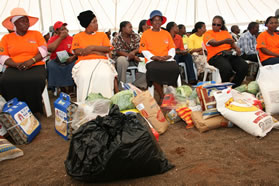 The programme also promotes a clean environment through reducing waste by recycling and reusing. So far, it has created over 3 000 job opportunities.
The programme also promotes a clean environment through reducing waste by recycling and reusing. So far, it has created over 3 000 job opportunities.
The programme was initiated and implemented by the Department of Public Works as part of the Expanded Public Works Programme (EPWP) in partnership with the Independent Development Trust.
Food vouchers
Explaining how the programme works, Public Works spokesperson Lucky Mochalibane said members of communities collected waste, which they handed over to their municipal offices in exchange for food vouchers. He said the waste was weighed and community members received food vouchers accordingly. The programme is run in collaboration with local grocery stores and food chains.
EPWP
Apart from Food for Waste, the EPWP has created thousands of other jobs. Minister of Social Development, Bathabile Dlamini, said since the beginning of 2011, more than 300 000 work opportunities had been created through the EPWP.
Climate Train steams to your doorstep
Climate Train steams to your doorstep Estelle GreeffAdvice & Events
In an effort to lessen the effects of natural disasters caused by climate change, more than 25 000 delegates from all over the world will meet at an international conference called COP 17 in Durban from 28 November to 9 December.
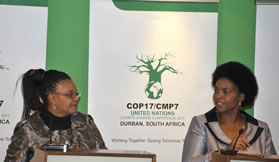 COP 17 is short for the 17th Conference of Parties to the United Nations Framework Convention on Climate Change (UNFCCC). The South African Government is the official host of the COP 17 conference.
COP 17 is short for the 17th Conference of Parties to the United Nations Framework Convention on Climate Change (UNFCCC). The South African Government is the official host of the COP 17 conference.
Natural disasters
Natural disasters have resulted in hundreds of lives being lost with infrastructures such as homes, roads, hospitals and factories being destroyed. These disasters have taken the form of earthquakes, floods, hurricanes, tsunamis, drought, rising sea levels and unusually hot weather conditions.
Awareness
To create awareness among the wider public about the dangers of climate change, government has started various education programmes. These include provincial awareness summits about the forthcoming conference.
The awareness campaign also includes the Climate Train, which will travel across South Africa.
Organised by the Department of Environmental Affairs, the Climate Train will carry a team of experts who will educate communities along the way until it reaches Durban. It will stop at cities and towns in each province including Port Elizabeth, George, Cape Town, Beaufort West, De Aar, Kimberley, Bloemfontein, Klerksdorp, Potchefstroom, Krugers-dorp, Musina, Makhado, Polokwane, Pretoria, Johannesburg, Vereeniging, Kroonstad and Ladysmith.
Open to all
Once in Durban, the team will continue to educate people through exhibitions, classes and talks.
There will also be tours of the exhibition outside the Inkosi Albert Luthuli International Convention Centre where the conference will be held. Tours and classes will be open to all including schools and tour groups.
For more information, call the Department of Environmental Affairs on 086 111 2468.
Census 2011 - What you can expect
Census 2011 - What you can expect Estelle GreeffAdvice & Events
Census 2011 will be conducted from 10 to 31 October 2011. About 192 000 fieldworkers with questionnaires will be visiting homes throughout the country.
 With just a few days to go before South Africa's 2011 Census, government urges people to get ready to be counted.
With just a few days to go before South Africa's 2011 Census, government urges people to get ready to be counted.
As part of Statistics South Africa's"Know Your Enumerator" campaign, a total of 2,8 million posters with photos and contact details of the fieldworkers will be distributed ahead of Census 2011. The posters will be displayed on street poles.
Stats SA fieldworkers will wear yellow bibs during the census. They will be familiar with their area of responsibility and will carry letters signed by the Statistician-General. They will also carry special identity cards with photos and identification numbers. If people are in doubt about fieldworkers, they can call the toll-free number 0800 110 248 to verify them.
Government has warned that people who stop or restrict fieldworkers from doing their work will face a six-month jail term or a R10 000 fine or both. Results of the South African census are expected to be released in November 2012.
Breast cancer - She turned tragedy into victory
Breast cancer - She turned tragedy into victory Estelle GreeffAdvice and Events
When Rita Naidoo’s greatest nightmare became a reality, she didn’t let it get her down. Instead, her life has never been better. Nine years after being diagnosed with cancer, she understands how blessed she is to be alive.
 At the time of her diagnosis, Rita was only 33 years old; she was married and had small children. The future seemed bleak. She not only lost her breast, but also her hair. The experience left Rita traumatised, but she didn’t give up. Eventually, the tragedy turned into a victory.
At the time of her diagnosis, Rita was only 33 years old; she was married and had small children. The future seemed bleak. She not only lost her breast, but also her hair. The experience left Rita traumatised, but she didn’t give up. Eventually, the tragedy turned into a victory.
Overcoming fears
At the darkest point of her journey, she became involved with the Cancer Association of South Africa (CANSA), where she learned to direct her anger towards overcoming her fears.
Rita’s nursing career is flourishing. She serves as the unit manager of cardiac rehabilitation. She is passionate about her work. She also promotes cancer awareness. She is the founder and has been the health chair of Relay For Life for three years.
In addition, Rita has been hosting the Life Westville Hospital’s annual Cuppa for CANSA since 2007 and helped with the International Cancer Survivors Day, an annual worldwide celebration of life held on the first Sunday of June.
Rita now takes each day as an opportunity to serve others. She believes that every day of life is a gift from God, and health and happiness are blessings that must be cherished.
Breast cancer can be beaten
Breast cancer can be beaten Estelle GreeffAdvice and Events
October is Breast Cancer Awareness Month. Breast cancer is the most common cancer in women worldwide and affects one in 29 women in South Africa. But it does not have to be a death sentence especially if it is detected and treated in time.
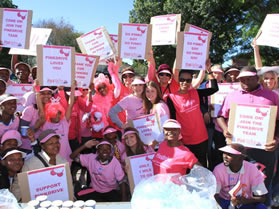 Making strides in the prevention and awareness of breast cancer is the PinkDrive campaign and the Cancer Association of South Africa (CANSA). The PinkDrive was tarted by the non-profit organisation Cause Marketing Fundraisers.
Making strides in the prevention and awareness of breast cancer is the PinkDrive campaign and the Cancer Association of South Africa (CANSA). The PinkDrive was tarted by the non-profit organisation Cause Marketing Fundraisers.
Supported by the Department of Heath, the PinkDrive is committed to improving breast cancer awareness, education, and providing and offering services to women across South Africa, particularly to those who do not have access to information on breast health.
Communities
The Pink Drive currently has two mobile breast units working in four provincial hospitals in Gauteng, serving some 1,6 million women.
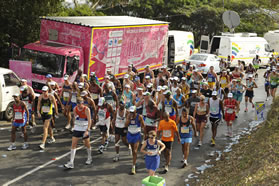 They aim to provide affordable, convenient mammography services to women in the private and corporate sectors; and provide free scanning and education to disadvantaged communities via local clinics, community health centres and specified hospitals with no oncology facilities.
They aim to provide affordable, convenient mammography services to women in the private and corporate sectors; and provide free scanning and education to disadvantaged communities via local clinics, community health centres and specified hospitals with no oncology facilities.
In the past year the campaign has conducted 2012 mammograms, 16 244 clinical breast examinations and has educated over 20 000 and counting women on breast cancer.
Early detection
If detected early, there are more treatment options for breast cancer and a better chance of survival.
 Breast cancer is usually detected by a lump in the breast. Many breast lumps are not-cancerous or life-threatening, but some can increase the risk of breast cancer. Men also get breast cancer, which can occur at any age, but older men are more at risk. Should you come across a lump on your breast, consult your clinic or doctor immediately.
Breast cancer is usually detected by a lump in the breast. Many breast lumps are not-cancerous or life-threatening, but some can increase the risk of breast cancer. Men also get breast cancer, which can occur at any age, but older men are more at risk. Should you come across a lump on your breast, consult your clinic or doctor immediately.
What are the symptoms of breast cancer?
 Early breast cancer usually doesn’t show symptoms, but as the tumour grows, it can change how the breast looks or feels. Signs of breast cancer include:
Early breast cancer usually doesn’t show symptoms, but as the tumour grows, it can change how the breast looks or feels. Signs of breast cancer include:
- a change in the shape or size of the breast
- a lump or thickening in or near the breast or in the armpit area
- dimpling in the skin of the breast
- the nipple turning inward into the breast
- unexpected, abnormal discharge of fluid from the nipple
- a change in the colour or feel of the skin of the breast or around the nipple
- swelling, redness or a feeling of ‘heat’ in the breast.
Breast examination
Remember, even if you feel healthy now, just being a woman and getting older puts you at risk of getting breast cancer.
Getting checked regularly can put your mind at ease. Know how your breasts normally look and feel and report changes to your doctor right away. Do a breast self-examination at least once every month.
Breast Self-Examination is as easy as 1-2-3
- In the mirror
In front of a mirror, check for any changes in the normal look and feel of your breasts, such as dimpling, size difference or nipple discharge. Inspect four ways: arms at sides; arms overhead; firmly pressing hands on hips and bending forward.
- Lying down
Lie on your back with a pillow under your right shoulder and your right hand under your head. With the three middle fingers of your left hand make small circular motions, follow an up and down pattern over the entire breast area, under the arms and up to the shoulder bone, pressing firmly. Repeat using right hand on left breast.
- While bathing
With your right arm raised, check your right breast with a soapy left hand and fingers flat using the method described under “Lying down”. Repeat on the other side.
Do a self breast-examination every month seven to 10 days after your period every month.
For more information about breast cancer, call the CANSA toll free number on 0800 22 66 22 or visit www.cansa.org.za or contact the PinkDrive on 011 998 8022 or visit www.pinkdrive.co.za.
Letters to the Editor - Give us a piece of your mind
Letters to the Editor - Give us a piece of your mind Estelle GreeffWinning letter - Use your talents
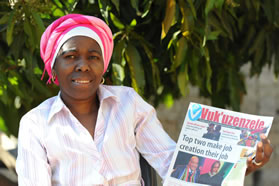 Spring is here and this is the season to start planting seeds. With poverty striking many families, we need to use our free natural resources such as rain and sunshine to eradicate poverty. Laying out a vegetable garden in our backyard is important in more ways than one. Nurturing the plants is one of the most exciting pastimes we can choose as a hobby. Instead of buying vegetables we can grow our own. We can use the money we save to buy other needs for our gardens. By ignoring agriculture we let the money take full control of our lives. Poverty will be easily eradicated if we can produce our own food. Let's make this summer an agricultural season. – Ephenia Moffat, Ga-Rankuwa, Gauteng
Spring is here and this is the season to start planting seeds. With poverty striking many families, we need to use our free natural resources such as rain and sunshine to eradicate poverty. Laying out a vegetable garden in our backyard is important in more ways than one. Nurturing the plants is one of the most exciting pastimes we can choose as a hobby. Instead of buying vegetables we can grow our own. We can use the money we save to buy other needs for our gardens. By ignoring agriculture we let the money take full control of our lives. Poverty will be easily eradicated if we can produce our own food. Let's make this summer an agricultural season. – Ephenia Moffat, Ga-Rankuwa, Gauteng
We would like to hear from you
If any of the information published in Vuk'uzenzele has helped you in any way to improve your life, we would love to hear from you. Don't forget to include your telephone or cellphone number and address.
Thank you Vuk'uzenzele
Firstly, I would like to say thank you for bringing the free paper to our homes. In August I found the Vuk'uzenzele news- paper at Maggies tuck shop at Ga-Rankuwa. I turned to page 10 were there is bursaries, I read and read. Wow interesting. Turn again to page 3 - Priority: health. It was about more than 11 million people tested for HIV. After reading the story, I visited Phedisong Clinic and I am now one of millions of people who tested for HIV. I love your paper. Vuk'uzenzele, you are really helping people and I am proud to be South African.
– Peter Mathunya, Ga-Rankuwa, Gauteng
Pollution is a man-made killer
Our environment is in danger. We abuse the planet by polluting it with litter and poisonous substances. Pollution is the harmful effect that such substances have on the environment. This includes all waste material like household refuse, and industrial waste products. It is also things like insecticides and radioactive waste.
To address this issue, we can create awareness and highlight what communities can do to combat pollution. We should discourage littering. Smokers should not flick cigarette butts in the air; they can start veld fires. Pollution is harmful to all living beings and its results can cause disease. You can do your bit to solve our country's pollution problem.
– Ezekiel Radebe, Heilbron, Free State
Contact centres for youth development
Contact centres can be great tools to develop the skills of the youth. To make the best career choice, you need to understand yourself and know what you want in life. Professional counsellors can give mentorship and advice. Through contact centres, job seekers can be exposed to job opportunities.
Volunteering is also a good way to develop skills and gain work experience. We can learn from and/or collaborate with other organisations and businesses to create forums that will benefit communities. More contact centres should be established to create jobs, and therefore, overcome poverty.
– Angela van der Merwe,Skilpadfontein, Mpumalanga
Send your letters to:
Vuk'uzenzele, Private Bag X745, Pretoria, 0001, or e-mail: vukuzenzele@gcis.gov.za.
If you don’t want your real name published you may use a different name, but please include your real name and address.
Please note:
To win a prize you must include a physical address and a contact telephone number.
Prizes that re not claimed within 90 days of publication, will be forfeited.
A blessing keeps orphans going
A blessing keeps orphans going Estelle GreeffYouth matters
Sibu Lusaseni was only nine years old when her mother passed away. Nobody in the community of KwaLanga was able to support her and her brother, but the two orphans managed to survive, thanks to a child support grant from government.
Lusaseni noticed that her brother would go to a nearby building and come back with food and some money which helped her go to school. This is when she discovered how blessed they were to live in a country, which made things better for vulnerable children.
Guardian angel
“I didn’t know who my brother was meeting in that building, but when he returned, we had food on the table and money to go to school,” said Lusaseni, who called her brother a guardian angel.
Commenting on government’s social protection programmes, Lusaseni thanked government, her community and non-governmental organisations for making it possible for her to reach her goals in life. “You may think you are doing small things, but they make a big difference to vulnerable children,” she said.
Extra income
Studies by the United Nations Children’s Fund, the Financial and Fiscal Commission of South Africa and the Department of Social Development showed that child support grants reduced the level and harshness of poverty during economic difficulties.
The study was done to evaluate the effect of the 2008/2009 economic downturn on children in South Africa. It found that child support grants playd a major role in helping poor households to survive during times of economic difficulties.
Caring society
As a beneficiary of the child support grant while she was growing up, Lusaseni acknowledged the role played by the grants emphasising that they made her strong. “The grants didn’t make me lazy, but made me more of myself…let’s not forget that we are building a caring society together,” said Lusaseni.
Lusaseni is now happily married and running her own business. Among other things, she is a public speaker who motivates people using her own experiences.
Safety net
According to our Constitution everyone has a right to social security. By the end of March this year, more than 10 million children were benefiting from child support grants.
“We have been very aware that our social assistance programme does provide a basic safety net for the millions of South Africans, especially young, aged and the disabled,” said Minister of Social Development Bathabile Dlamini. She challenged department officials to go out and search for all children who qualified for grants, but were not getting them.
For more information, call the Department of Social Development at 012 312 7450 or 1020.
Farming passion sprouts opportunities
Farming passion sprouts opportunities Estelle GreeffYouth matters
A group of young people with a passion for farming are feeling a great sense of fulfilment through the succes of their business. They have created 75 jobs, reduced poverty and minimised food shortage in their community.
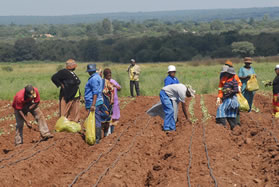 The Bana Ba Kgwale co-op was started in 2007 by a group of 10 young people from Jericho Village in North West. With hard work and determination, they are now enjoying the fruits of a successful, fast-growing business.
The Bana Ba Kgwale co-op was started in 2007 by a group of 10 young people from Jericho Village in North West. With hard work and determination, they are now enjoying the fruits of a successful, fast-growing business.
“Having started off as students at the African Farming Franchise, we, as Bana Ba Kgwale, are feeling a great sense of fulfilment being where we are today”, said co-op representative, Orphan Mashala.
Donations
A donation of 440 hectares of land by the village’s tribal council has boosted their production. They are currently using 22 hectares to produce vegetables such as cabbage, spinach, maize, tomatoes and pumpkins. These are supplied to large retail outlets such as Pick ‘n Pay in the Madibeng Local Municipality, as well as the Tshwane Fresh Produce Market.
A donation of much-needed farming implements by the Department of Agriculture in the North West has also helped to boost production. They received two tractors, an irrigation system, a trailer and a disc plough, which is used almost on a daily basis.
Develop skills
An important aim of this project is to minimise food shortage and unemployment in Jericho. This has been partly achieved through the creation of 75 job opportunities for local villagers. In addition, two experienced contractors have been hired. By working with them, local farm workers have been able to learn from them and develop new skills.
One of the goals of Bana Ba Kgwale is for each member to build up his or her own business on approximately 22 hectares of land. By doing so, they will be able to create even more jobs in their community, reduce poverty and eliminate food shortage.
For more information, call 018 389 5719/5684
Funds to help you graduate
Funds to help you graduate Estelle GreeffYouth matters
Have you, or somebody you know, completed their university studies between 2000 to 2010? Were you unable to graduate and obtain your diploma or degree for the reason that you are still owing universities fees?
If you have answered yes, there is good news for you. The Department of Higher Education and Training has made R200 million to help you settle outstanding university fees you owe. The funds are administered by the National Student Financial Aid Scheme (NSFAS).
Loan
However, this is not a bursary but a loan, which you will have to pay back once your financial situation improves.
Students have to apply at the university where the debt has been incurred. They have to follow the usual process for a NSFAS loan by going through the financial means test, which assesses the financial position of the beneficiary or family. Applicants must be South African citizens.
Supporting documents must be submitted with applications. These include certified copies of both the applicant and parents’ or guardian’s identity documents and proof of income for applicant, if working, or family member who is supporting the student.
Specific repayment terms will be set.
Who will be considered?
Students who passed their undergraduate diploma and with family income of less than R120 000 per year, will be considered first.
Thereafter, students who meet the requirements of the NSFAS means test and with a family income of between R120 000 and R250 000 per year will be considered.
Honours students who meet the requirements of the NSFAS means test will be considered next, with those with a family income of between R120 000 and R250 000 to be considered if funds are available.
Finally, Masters and Doctoral students who meet the requirements of the NSFAS means test will be considered, followed by those Masters and Doctoral students whose family income is between R120 000 and R250 000, if funds are available.
Department of Higher Education and Training call centre: 0800 87 222 or 1020.
Meet Minister S'bu Ndebele
Meet Minister S'bu Ndebele Estelle GreeffKnow your Minister: Transport
Minister of Transport S'bu Ndebele was born in October 1948 in the battlefield area of Rorke's Drift in KwaZulu-Natal. He completed his primary education at Makhasaneni in Melmoth and matriculated at Entembeni Secondary School. He then enrolled for a teacher's training course in Eshowe.
University
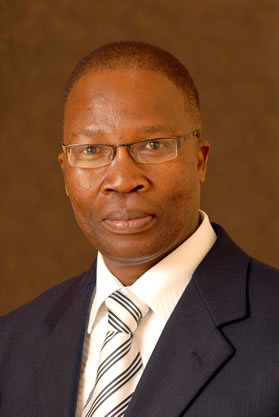 In 1972, Minister Ndebele obtained a degree in library science from the University of Zululand of which he is now Chancellor. He was actively involved in the University Christian Movement and later with the South African Students Organisation (SASO). In 1972, he became Publicity Secretary of SASO for the University of Zululand.
In 1972, Minister Ndebele obtained a degree in library science from the University of Zululand of which he is now Chancellor. He was actively involved in the University Christian Movement and later with the South African Students Organisation (SASO). In 1972, he became Publicity Secretary of SASO for the University of Zululand.
After joining the African National Congress (ANC) underground, he went into exile in Swaziland. In May 1976, he was arrested for ANC activities and was sentenced to 10 years imprisonment on Robben Island in June 1977.
MEC of Transport
Between 1990 and 1996, he was the Regional Secretary of the ANC for the then Southern Natal Region. He later became a member of the National Executive Committee of the ANC.
In 1994, Minister Ndebele became MEC for Transport in KwaZulu-Natal. He held the position until 2004, earning him the title of being the longest serving Transport MEC. From 2004 to 2009, he was Premier of KwaZulu-Natal.
Safety awareness
During his time as MEC for Transport in KwaZulu-Natal, Minister Ndebele piloted a number of road safety awareness programmes and road maintenance programmes. Among other things, he introduced a zero-tolerance visible traffic policing programme, which made KwaZulu-Natal roads known for their zero tolerance to speeding motorists.
Minister Ndebele is married to Zama and the couple has two children.
Blitz for passenger safety
Blitz for passenger safety Estelle GreeffKnow your minister: Transport
No more shall our people die in so many accidents. We say no more shall our people die deaths which can be avoided”, said Minister. Sibusiso Ndebele when he launched Transport Month last year.
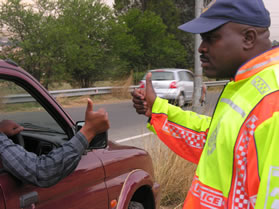 This year Minister Ndebele calls upon all public transport operators to take responsibility for the safety of their commuters. He said this should be part of our commitment to road safety in this Global Decade of Action for Road Safety 2011-2020.
This year Minister Ndebele calls upon all public transport operators to take responsibility for the safety of their commuters. He said this should be part of our commitment to road safety in this Global Decade of Action for Road Safety 2011-2020.
As part of the nation-wide blitz on scholar transport and other public transport vehicles, close to 50 000 scholar transport vehicles have been stopped and checked across the country in September.
This follows instructions from Transport Minister Sibusiso Ndebele to law enforcement officers to stop and check every bus and taxi on South Africa’s roads, following the deaths of at least 76 people in August.
Condolences
The deaths occurred in eight separate crashes involving public transport vehicles such as buses and mini-bus taxis in KwaZulu-Natal, Free State, Mpumalanga, Western Cape, Gauteng and Eastern Cape.
Minister Ndebele conveyed condolences to the family and colleagues of lightweight boxer Bongani Dlamini, who died in a car accident in Sandringham, Johannesburg. “We want to convey condolences to the family, colleagues and fans of boxer Bongani Dlamini who was killed in a car crash, and wish those injured a speedy recovery. We are calling upon the boxing fraternity to partner with government against road deaths, and all of us must ensure that this never happens to others,” the Minister said.
Scholar transport
From 31 August to 5 September, more than 48 000 scholar transport vehicles were stopped and checked, 210 scholar transport vehicles were discontinued from use and more than 10 000 fines were issued.
On 2 September, in Gauteng, officers from the National Traffic Unit, Cross Border Road Transport Agency, Gauteng Traffic Police and South African Police stopped and checked more than 2 000 vehicles, including 330 public transport vehicles.
School buses and taxis were also stopped and checked in other provinces.
Enforcement plan
So far, as part of the new National Rolling Enforcement Plan (NREP), almost 12 million vehicles and drivers have been checked from 1 October 2010 to 31 July 2011.
Almost 5 million fines have been issued for various traffic offences, more than 17 000 drunk drivers have been arrested and about 47 000 un-roadworthy vehicles, the majority of which are buses and taxis, have been taken off the roads.
Major facelift for 20 townships
Major facelift for 20 townships Estelle GreeffKnow your minister
Rundown townships in Gauteng will soon receive major facelifts, thanks to the province's 20 Priority Township Project. The project aims to improve the lives of citizens by changing 20 townships into decent residential areas.
Billions of rands have been put aside to build safe and sustainable communities where residents will have decent shelter with all necessary facilities, such as clinics, roads, schools, sport and recreation facilities, streetlights and shopping malls.
The project received support from the provincial Department of Roads and Public Transport and the Department of Agriculture, Conservation and Environment. This enables the Department of Housing to improve infrastructure, including tarring roads, providing electricity, water and sanitation, building and renovating houses and planting trees.
The townships which will benefit from the project are Atteridgeville/Saulsville, Soshanguve, Mamelodi, Kagiso, Munsieville, Mohlakeng, Boipatong, Bophelong, Sharpeville, Sebokeng, Ratanda, Katlehong, Kwatsaduza (KwaThema, Tsakane, and Duduza), Wattville, Daveyton, Tembisa, Refilwe, Rethabiseng as well as Orlando and Zola in Soweto.
For more nformation, call the Department of Roads and Public Transport at 011 355 6000.
Sizzling success for Limpopo hotline
Sizzling success for Limpopo hotline Estelle GreeffPresidential Hotline
Less than five months after it was set up, the Limpopo provincial government's own Premier's Hotline has recorded remarkable success in speedily helping callers in the province to resolve problems.
 In April this year, Limpopo Premier Cassel Mathale officially launched the province’s Premier’s Hotline to complement the existing Presidential Hotline launched by President Jacob Zuma two years ago.
In April this year, Limpopo Premier Cassel Mathale officially launched the province’s Premier’s Hotline to complement the existing Presidential Hotline launched by President Jacob Zuma two years ago.
“The hotline will ensure that the government is able to provide efficient, effective, excellent, equitable and empowering service to the people in the province,” said Premier Mathale. “Departments and municipalities will respond and resolve the complaints brought through the hotline line speedily, competently and satisfactorily,” he added.
Official languages
The hotline call centre operators take calls in the following official languages: Sesotho sa Leboa, English, isiNdebele, Tshivenda, SiSwati, XiTsonga and Afrikaans.
Located in the Office of Premier Mathale in Polokwane, the call centre is staffed by about 23 operators on a rotating basis, five days a week during office hours.
According to the Hotline Programme Manager Adelaide Phukubyi, the provincial hotline has improved service delivery in the province as more and more people were aware of its existence and its usefulness.
Solved in a month
“Since we started operating last April, we’ve had our hands full as people call to report problems relating to unhappiness about government services from national, provincial, district municipality and local municipality level,” said Phukubyi.
She added that the Hotline had a system that recorded all incoming calls and then checked progress up until the matter has been resolved. The Premier made a commitment to improve service delivery. The aim is to resolve all reported problems within a month from the date the first call was recorded at the call centre.
Progress
“We work with other provincial government departments as well as municipalities. On receiving a complaint, we forward the matter at hand to the relevant department or municipality giving them at least two weeks to attend to the problem. During this two-week period, we are able to check on follow-up actions to see what progress had been made,” said Phukubyi.
After the problem had been resolved, Hotline staff follow up with the complainant to make sure that he or she is satisfied with the way it had been dealt with.
– Premier Cassel Mathale
Awareness
“Presently, we are involved in massive campaign to create awareness about the Premier’s Hotline among the people of the province. We are aware that there is still some confusion among members of the public about the Presidential Hotline and the Premier’s Hotline,” she said.
Many people still believe that reporting the matter to the Presidential Hotline means it will be attended to faster than the Premier’s Hotline, but the work rate is the same. “In fact, the setting up of the Provincial Hotline was set up to reduce the workload of the Presidential Hotline, particularly those calls coming from our Province,” said Phukubyi.
Less pressure
Phukubyi explained that the setting up of the Premier’s Hotline has also helped to do away with duplication; for example where the same person reports the matter to both the Presidential Hotline and the Premier’s Hotline.
The way in which calls are recorded both at the Presidential Hotline and the Premier’s Hotline shows duplicated complaints, which are then assigned to one person to attend to the matter. “This helps to take some pressure off the Presidential Hotline,” she said.
KZN hot on Limpopo's heels
Hot on the heels of the Limpopo Premier's Hotline, the KwaZulu-Natal Provincial Government officially launched its own Premier's Hotline on 23 September.
The KwaZulu-Natal Premier's Hotline Call Centre, which is housed in the Office of Provincial Premier Dr Zweli Mkhize's Pietermaritzburg Headquarters, also offers a walk-in facility. Head of the Public Liaison Unit in the Premier's Office, Cecil Msomi said this would allow members of the public to visit the call centre to report their problems in person.
The Limpopo Premier’s toll-free hotline number 0800 864 729 is available to all the people of the province.
Plan for better services gains pace
Plan for better services gains pace Estelle GreeffPresidential hotline
As the new term of office for municipal leadership begins, there's renewed focus on improved service delivery, better governance and financial management.
To help municipalities reach service-delivery goals, the Local Government Turnaround Strategy (LGTA) was approved by Cabinet in 2009. One of its main aims is to restore the confidence of people in municipalities by improving the way local governments are run.
Proper management
It strives to ensure that municipalities have proper management, administrative and technical skills to improve their performance. This includes developing specific implementation plans for every municipality in South Africa.
Speeding up
However, because many municipalities are still struggling to reach service-delivery goals, a new revised Local Government Turnaround Strategy called the Accelerated Turnaround Strategy is being put into practice.
Deputy Director-General of Cooprative Governance and Traditional Affairs Ricardo Hansby said the new Accelerated Turnaround Strategy was developed to speed up implementation of the programme.
The programme enjoys the support of Cabinet Ministers and MECs.
It has a broader approach that will addresses critical issues raised by communities. Since community participation is key to the success of the strategy, efforts will be made to involve the active participation of communities.
Drivers of the programme
Hansby said municipalities would therefore continue to consult with communities.
“However, a lot more still needs to be done to get communities involved, not just as part of the LGTAS, but to play a role as advocates and drivers of the programme in a much more practical and visible manner,” Hansby added.
With the introduction of the revised Accelerated LGTAS programme councillors should ensure that there is also revived and renewed energies and willingness through community participation across political spectrums.
Remote rural areas
Councillors are therefore encouraged to raise awareness about the programme among communities.
This will benefit the country as a whole since better services will improve people’s lives by meeting their basic needs.
Special efforts will be made to improve service delivery in remote and rural areas – where there is poverty, underdevelopment and a lack of skills in municipal management.
For more information, call the Department of Cooperative Governance and Traditional Affairs Head Office at 012 334 0600.
SA rises to support Somalia
SA rises to support Somalia Estelle GreeffInternational relations
Some 12 million people in Somalia face hunger and starvation. Five regions of south-central Somalia where scores of people, mostly children, are dying of starvation, have been declared famine zones after the worst drought in years dried up the region over the past several months.
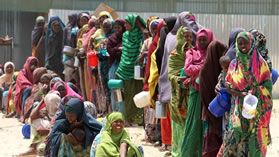 Apart from the long drought, a civil war has also gripped the country for several years. This has forced more than a million people to flee their homes due to extreme violence across the country.
Apart from the long drought, a civil war has also gripped the country for several years. This has forced more than a million people to flee their homes due to extreme violence across the country.
Food and skills
Together with aid organsations such as the Gift of the Givers, South Africa, through President Jacob Zuma’s Comprehensive Strategy for Somalia, has committed R8 million to assist Somalians.
This contribution does not only include food. Assistance will also be given in the form of helping to bring about social and political stability through development programmes. These will include skills training and building up government institutions, as well as sharing experiences of peace-building.
Government has also made available a military aircraft for Gift of the Givers. They have delivered several tonnes of essential food and anti-malaria medication to Mogadishu.
Gift of the Givers, which has a team of helpers including doctors and specialists, has been in and out of Somalia where they have set up a hospital to help sick and injured people. They distributed high-energy nutrition packages to the region in July and are preparing to send more aid by flight and boat in the future.
Heartbreak
 Founding member of the organisation, Imtiaz Sooliman, said the situation in Somalia was horrifying. He said there was a shortage of food and water as well as a lack of medical facilities, doctors, nurses and medical supplies.
Founding member of the organisation, Imtiaz Sooliman, said the situation in Somalia was horrifying. He said there was a shortage of food and water as well as a lack of medical facilities, doctors, nurses and medical supplies.
Somali mothers are so under-nourished that they are unable to produce breast milk and two-year old children look like three-month old infants because of hunger, he said. Other diseases like malaria and pneumonia are common. “It was heartbreaking. Children are dying slowly. Parents watch their children die and can’t do a thing about it.”
Brothers and sisters
Sooliman said that although businesses had responded to the call in cash and kind such as donating funds to rent aircraft, they hoped that more people would get involved so that more lives could be saved.
He said Africa should lead efforts to help Somalia, because “…they are our brothers and sisters. We need to save lives and to provide high-energy supplements, medicine, medical teams and food. We need to put up tents. If people can provide cash, even if it is a small amount ... this is Africa and these are our people. They need our assistance”.
Anyone wishing to help Somalia through donating to the Gift of the Givers can call them on 0800 786 911.
Loan helps stabilise Swaziland
Loan helps stabilise Swaziland Estelle GreeffInternational relations
There has been a lot of criticism and questions about the issue of Swaziland getting a large loan from South Africa to help overcome its financial crisis. Some argue that South Africa should not have approved the R2,4 billion loan to a government that has been wasting money, while most of the people are living in poverty.
Some argue that South Africa should not have approved the R2,4 billion loan to a government that has been wasting money, while most of the people are living in poverty.
Protests
The country has been rocked by recent protests after civil servants said they had not been paid. The crisis also caused the University of Swaziland to cancel classes. In addition, there are reports that the country, which has a high HIV infection rate, is running out of supplies of antiretroviral drugs to treat the disease.
Swaziland was plunged into a financial crisis following the worldwide economic downturn in 2009, which caused a drop in income from the Southern African Customs Union. This is a customs sharing scheme between South Africa, Botswana, Lesotho, Namibia and Swaziland. King Mswati tried, but failed to get cash from other sources.
Neighbouring countries
The economic and political downfall of Swaziland will not only affect the Swazi nation, but will also have a negative effect on its neighbouring countries, especially South Africa.
It could lead to a situation similar to that in Zimbabwe, where the economic and political crisis forced a flood of illegal immigrants to seek refuge and jobs in South Africa.
Loan guarantee
Helping to stabilise the situation in Swaziland, the loan from South Africa will prevent a similar a situation from arising there.
“The loan guarantee was on condition that the government of Swaziland undertakes confidence-building measures, guided by the Joint Bilateral Commissions for Cooperation (JBCC) Agreement,” the Minister of Finance, Pravin Gordhan said.
Promotes democracy
The JBCC Agreement promotes the principles of democracy, respect for universal human rights and the rule of law. Minister Gordhan added that Swaziland would have to give renewed energy to these principles by extending the discussion process to include all interested parties and citizens of the country.
He gave the assurance that the money was provided by the South African Reserve Bank on a 5,5 per cent interest rate.
Norway visit boosts trade and jobs
Norway visit boosts trade and jobs Estelle GreeffInternational relations
President Jacob Zuma and several Cabinet members visited Norway recently to increase trade between Norway and South Africa. This is part of government's commitment to create jobs as set out in the New Growth Path.
The President's visit followed a state visit by Norway's King Harald V to South Africa in 2009.
President Zuma said the State visit would strengthen cooperation between the two countries, especially in addressing national priorities such as reducing poverty, inequality and unemployment.
A South African business delegation accompanied the President to explore opportunities to further boost economic ties between the two countries.
Trade between South Africa and Norway has increasing in value, from R746 million in 2005 to more than R3 billion last year.
This growth was driven by a major increase in South African exports to Norway since South Africa became a net exporter to Norway in 2007.
President Zuma said South African companies would like to partner with Norwegian companies in the oil and gas industries, as well as environment and marine technology and innovation and knowledge-based fields.
For more information, call the Department of International Relations and Cooperation 012 351 1000.
Let's be kind to the environment
Let's be kind to the environment Estelle GreeffFun & games
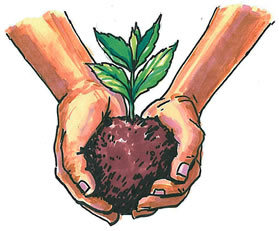 There's been a lot of talk in the media lately about climate change and the negative effect it has on the enviornment. It leads to natural disasters such as earthquakes, floods, hurricanes and tsunamis. But human actions can also affect the environment negatively.
There's been a lot of talk in the media lately about climate change and the negative effect it has on the enviornment. It leads to natural disasters such as earthquakes, floods, hurricanes and tsunamis. But human actions can also affect the environment negatively.
A lot of the things we use in our homes and at work, as well as some of the things we do affect the environment in some way or another. It can be products we use to clean our homes, polllution from traffic, using more electiricity and water than we really need and the waste materials we throw away.
How can we be more eco-friendly?
- Plastic is a major cause of environmental pollution, so don’t throw away your old plastic bags; use them every time you go shopping. You will save money and help the environment.
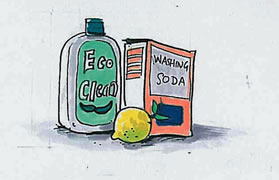 Use carrier bags made of cloth instead of plastic bags for grocery shopping.
Use carrier bags made of cloth instead of plastic bags for grocery shopping.- Save energy by using energy-saving light bulbs. Turn off lights, appliances and your television when you’re not using them. Turn your geyser to a lower setting. When boiling water use only the amount of water you will need.
- Use water sparingly.
- Use eco friendly products in your home like cleaning liquids with no harmful chemicals.
- Plant more trees; they help to filter pollution from the air, prevent soil erosion and provide people and animals with food and shelter.
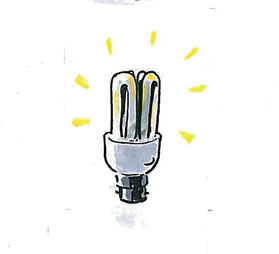 Things like glass, paper, and plastic can be recycled. Most Pick n Pay stores have in-store bins for recycling batteries, light bulbs, ink cartridges, plastic bags and packaging. For a countrywide list of Glass Banks from the Glass Recycling Company, visit www.theglassrecyclingcompany.co.za/
Things like glass, paper, and plastic can be recycled. Most Pick n Pay stores have in-store bins for recycling batteries, light bulbs, ink cartridges, plastic bags and packaging. For a countrywide list of Glass Banks from the Glass Recycling Company, visit www.theglassrecyclingcompany.co.za/
